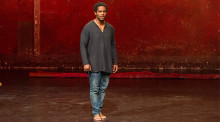Battlefield
>64558.
A partir du 15 septembre 2015 – Bouffes du Nord – Paris
 Le Mahabharata n’est pas seulement un livre, ou une série de livres, c’est un champ immense, qui couvre tous les aspects de notre existence. On y trouve les questions essentielles qui concernent notre vie, des questions qui sont à la fois contemporaines et urgentes. Le Mahabharata a été écrit il y a des milliers d’années, et pourtant il nous indique toujours, d’une manière inattendue, comment ouvrir nos yeux à ce que la réalité de nos vies demande.
Le Mahabharata n’est pas seulement un livre, ou une série de livres, c’est un champ immense, qui couvre tous les aspects de notre existence. On y trouve les questions essentielles qui concernent notre vie, des questions qui sont à la fois contemporaines et urgentes. Le Mahabharata a été écrit il y a des milliers d’années, et pourtant il nous indique toujours, d’une manière inattendue, comment ouvrir nos yeux à ce que la réalité de nos vies demande.
Le texte parle d’une grande guerre d’extermination, une guerre qui déchire une même famille – la grande famille des Bharata. D’un côté se trouvent cinq frères, les Pandavas, de l’autre, leurs cousins, les Kauravas, les cent fils du Roi aveugle Dritarashtra. Des deux côtés des armes de destruction massive sont utilisées. La richesse du langage de cette épopée millénaire, ses histoires toujours étonnantes, nous offrent la possibilité de faire revivre sous une forme théâtrale cette situation qui, bien qu’appartenant au passé, reflète en même temps les très durs et innombrables conflits qui déchirent notre monde aujourd’hui.
Texte : Peter Brook, Jean-Claude Carrière et Marie-Hélène Estienne
Mise en scène : Peter Brook et Marie-Hélène Estienne
Avec : Carole Karemera, Jared McNeill, Ery Nzarambaet, Sean O’Callaghan
Musique : Toshi Tsuchitori
Lumière : Philippe Vialatte
Costumes : Oria Puppo
Production C.I.C.T. – Théâtre des Bouffes du Nord
Coproduction Young Vic Theatre ; Les Théâtres de la Ville de Luxembourg ; PARCO Co. Ltd ; C.I.R.T. ; Singapore Repertory Theater ; Attiki Cultural Society.
——–
The Mahabharata is not simply a book, nor a great series of books, it is an immense canvas covering all the aspects of human existence. In it we find all the questions of our lives, in a way that is at once contemporary and urgent.
Over many thousands of years the Mahabharata shows us, in an always-unexpected way, how to open our eyes to what reality demands.
The Mahabharata speaks of a great war of extermination, which tears apart the Bharata family. On one side there are 5 brothers, the Pandavas, and on the other side their cousins, the Kauravas, the hundred sons of the blind King Dritarashtra. Both sides use terrible weapons of destruction. At the end the Pandavas win. Millions of dead bodies lie on the ground. And now the eldest of the Pandavas – Yudishtira – is compelled to become King. The victory has the bitter taste of defeat. Both Yudishtira and Dritarashtra, the old King, are in deep distress and remorse, questioning their past actions, trying to unravel their own responsibility for the disaster.
How, having to live with this terrible massacre, having lost their sons, their families, their allies, will the new King and the old one find an inner peace?
The richness of the language of this timeless epic, and its always astonishing stories, allow us to bring to the stage this situation, which, belonging to the past, reflects at the same time the harsh conflicts of today.